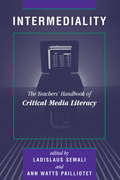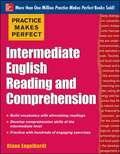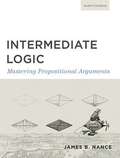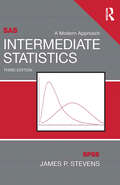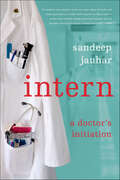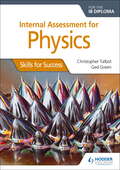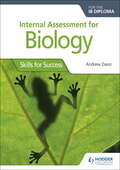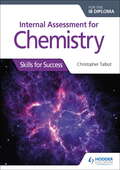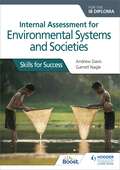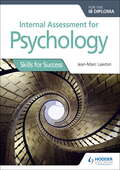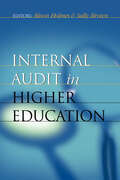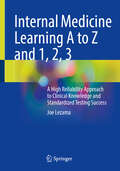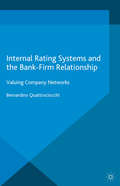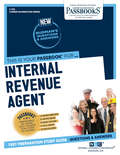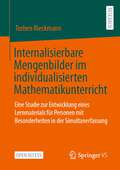- Table View
- List View
Intermediality: Teachers' Handbook Of Critical Media Literacy
by Ladislaus SemaliWith the ever-growing proliferation of electronic and other popular media, the complexity of relationship between what students see and hear, what they believe and how they interact with one another underscores now, more than ever, the need for across-the-curriculum teaching of critical thinking, critical reading, and critical viewing skills. The emerging consensus is that teaching critical viewing skills bolsters students' abilities in traditional disciplines, combats problems of youth apathy, violence, and substance abuse, and improves students', parents, and teachers' attitudes' toward school.Intermediality: Teachers' Handbook of Critical Media Literacy challenges the practice of teaching the classics and the canon of acceptable literary works far removed from students' experiences, with emphasis on learning environment over the presentation of any specific or specified content. The authors, Ladislaus Semali and Ann Watts Pailliotet, present literacy education as ?intermedial? in nature?it entails constructing connections among varying conceptions and sign systems. Reading printed texts requires more than simply decoding letters into words or sounds; it involves finding meaning, motive, structure, and affect. The same goes for reading the electronic text. The authors argue for the discourse of literacy to take up a critical stance by examining a whole wide array of texts that form the meaning-making process of the looming information age.Intermediality examines, extends, and synthesizes the existing literary definitions, texts, theories, processes, research and contexts. It brings into focus the possibilities of working with media texts to address questions adapted from linguists and literary educators. Thus, in this book, critical media literacy becomes a competency to read, interpret, and understand how meaning is made and derived from print, photographs and other electronic and graphic visuals.
Intermediate 1st Year English Text Book - Telangana Board
by M. Malahal Rao A. Parankusham P. Nageswara Rao Vasanta Pingali V. Babu Rao Dr E. Srinivas Rao A. Vishweshwara Sharma B.R.Sudheer ReddyThis is the prescribed text book for the subject of english for the students of Telangana Intermediate first year.
Intermediate English Reading and Comprehension
by Diane EngelhardtTake your skills to the next level and get moremeaning out of the English language Reading English texts that are created especially for ESL students like you is a critical part to learning the language, but that does not mean you have to be bored with the subjects! Created by expert ESL instructor Diane Engelhardt, Practice Makes Perfect: Intermediate English Reading and Comprehension features 15 engaging readings on interesting topics such as the technology of 21stcentury deep-sea treasure hunting, Pixar Studios'computer-generated movie magic, the Flying Doctors of Australia, and more. You will, of course, get plenty of practice, practice, practice on understanding and comprehending vocabulary. You'll master how to read for main ideas, summarize texts, make outlines, remember facts and figures, and more. Before you know it, your reading skills will be stronger and your comprehension will grow, enabling you to get more out of English-language texts. Practice Makes Perfect: Intermediate English Reading and Comprehension will help you: Develop your reading comprehension skills at theintermediate level Build your English vocabulary Prepare for the comprehension sections of ESL tests
Intermediate First Year Civics Text Book Telugu Medium - Telangana Board
by D Musalaiah Dr Bvv Balakrishna Dr S Yadagiri T Yadagiri V Bhogendracharyulu V Vasundhara DeviThis is the prescribed text book for the subject Civics to the students of Telangana Board Intermediate First year Telugu Medium
Intermediate First Year English Text Book - Andhra Pradesh and Telangana Board
by English Foreign Languages UniversityThis is the prescribed text book for students of Andhra Pradesh and Telangana for Intermediate First year students
Intermediate First Year Telugu Textbook - Telangana Board
by Acharya Banna IlaiahThis is the presecribed text book for Telugu - Second language for the first year students of Telananaga board, Telugu Medium
Intermediate First Year Telugu Textbook - Telangana Board
by Acharya Banna IlaiahThis is the presecribed text book for Telugu - Second language for the first year students of Telananaga board, Telugu Medium
Intermediate Logic: Mastering Propositional Arguments (Third Edition)
by James B. NanceThis text is designed as a continuation to Introductory Logic, which I co-authored with Douglas Wilson. Together, these two textbooks should provide sufficient material for a complete course in elementary logic.
Intermediate Statistics: A Modern Approach, Third Edition
by James P. Stevens Keenan A. Pituch Tiffany A. WhittakerJames Stevens' best-selling text, Intermediate Statistics, is written for those who use, rather than develop, statistical techniques. Dr. Stevens focuses on a conceptual understanding of the material rather than on proving the results. SAS and SPSS are an integral part of each chapter. Definitional formulas are used on small data sets to provide conceptual insight into what is being measured. The assumptions underlying each analysis are emphasized and the reader is shown how to test the critical assumptions using SPSS or SAS. Printouts with annotations from SAS or SPSS show how to process the data for each analysis. The annotations highlight what the numbers mean and how to interpret the results. Numerical, conceptual, and computer exercises enhance understanding. Answers are provided for half of the exercises. The book offers comprehensive coverage of one-way, power, and factorial analysis of variance, repeated measures analysis, simple and multiple regression, analysis of covariance, and HLM. Power analysis is an integral part of the book. A computer example of real data integrates many of the concepts. Highlights of the Third Edition include: A new chapter on hierarchical linear modeling using HLM6 A CD containing all of the book's data sets New coverage of how to cross validate multiple regression results with SPSS and a new section on model selection (Chapter 6) More exercises in each chapter. Intended for intermediate statistics or statistics II courses taught in departments of psychology, education, business, and other social and behavioral sciences, a prerequisite of introductory statistics is required. An Instructor's Resource is available upon adoption. See www.researchmethodsarena.com .
Intern: A Doctor's Initiation
by Sandeep JauharIntern is Sandeep Jauhar's story of his days and nights in residency at a busy hospital in New York City, a trial that led him to question our every assumption about medical care today. Residency—and especially the first year, called internship—is legendary for its brutality. Working eighty hours or more per week, most new doctors spend their first year asking themselves why they wanted to be doctors in the first place.Jauhar's internship was even more harrowing than most: he switched from physics to medicine in order to follow a more humane calling—only to find that medicine put patients' concerns last. He struggled to find a place among squadrons of cocky residents and doctors. He challenged the practices of the internship in The New York Times, attracting the suspicions of the medical bureaucracy. Then, suddenly stricken, he became a patient himself—and came to see that today's high-tech, high-pressure medicine can be a humane science after all.Now a thriving cardiologist, Jauhar has all the qualities you'd want in your own doctor: expertise, insight, a feel for the human factor, a sense of humor, and a keen awareness of the worries that we all have in common. His beautifully written memoir explains the inner workings of modern medicine with rare candor and insight.
Internal Assessment Physics for the IB Diploma: Skills for Success
by Christopher TalbotExam board: International BaccalaureateLevel: IB DiplomaSubject: PhysicsFirst teaching: September 2021First exams: Summer 2023Aim for the best Internal Assessment grade with this year-round companion, full of advice and guidance from an experienced IB Diploma Physics teacher.- Build your skills for the Individual Investigation with prescribed practicals supported by detailed examiner advice, expert tips and common mistakes to avoid.- Improve your confidence by analysing and practicing the practical skills required, with comprehension checks throughout.- Prepare for the Internal Assessment report through exemplars, worked answers and commentary. - Navigate the IB requirements with clear, concise explanations including advice on assessment objectives and rules on academic honesty.- Develop fully rounded and responsible learning with explicit reference to the IB learner profile and ATLs.
Internal Assessment Physics for the IB Diploma: Skills for Success
by Christopher TalbotExam board: International BaccalaureateLevel: IB DiplomaSubject: PhysicsFirst teaching: September 2021First exams: Summer 2023Aim for the best Internal Assessment grade with this year-round companion, full of advice and guidance from an experienced IB Diploma Physics teacher.- Build your skills for the Individual Investigation with prescribed practicals supported by detailed examiner advice, expert tips and common mistakes to avoid.- Improve your confidence by analysing and practicing the practical skills required, with comprehension checks throughout.- Prepare for the Internal Assessment report through exemplars, worked answers and commentary. - Navigate the IB requirements with clear, concise explanations including advice on assessment objectives and rules on academic honesty.- Develop fully rounded and responsible learning with explicit reference to the IB learner profile and ATLs.
Internal Assessment for Biology for the IB Diploma: Skills for Success
by Andrew DavisAim for the best Internal Assessment grade with this year-round companion, full of advice and guidance from an experienced IB Diploma Biology teacher.- Build your skills for the Individual Investigation with prescribed practicals supported by detailed examiner advice, expert tips and common mistakes to avoid.- Improve your confidence by analysing and practicing the practical skills required, with comprehension checks throughout.- Prepare for the Internal Assessment report through exemplars, worked answers and commentary. - Navigate the IB requirements with clear, concise explanations including advice on assessment objectives and rules on academic honesty.- Develop fully rounded and responsible learning with explicit reference to the IB learner profile and ATLs.
Internal Assessment for Biology for the IB Diploma: Skills for Success
by Andrew DavisExam board: International BaccalaureateLevel: IB DiplomaSubject: BiologyFirst teaching: September 2014First exams: Summer 2016Aim for the best Internal Assessment grade with this year-round companion, full of advice and guidance from an experienced IB Diploma Biology teacher.- Build your skills for the Individual Investigation with prescribed practicals supported by detailed examiner advice, expert tips and common mistakes to avoid.- Improve your confidence by analysing and practicing the practical skills required, with comprehension checks throughout.- Prepare for the Internal Assessment report through exemplars, worked answers and commentary. - Navigate the IB requirements with clear, concise explanations including advice on assessment objectives and rules on academic honesty.- Develop fully rounded and responsible learning with explicit reference to the IB learner profile and ATLs.
Internal Assessment for Chemistry for the IB Diploma: Skills for Success
by Christopher TalbotAim for the best Internal Assessment grade with this year-round companion, full of advice and guidance from an experienced IB Diploma Chemistry teacher.- Build your skills for the Individual Investigation with prescribed practicals supported by detailed examiner advice, expert tips and common mistakes to avoid.- Improve your confidence by analysing and practicing the practical skills required, with comprehension checks throughout.- Prepare for the Internal Assessment report through exemplars, worked answers and commentary. - Navigate the IB requirements with clear, concise explanations including advice on assessment objectives and rules on academic honesty.- Develop fully rounded and responsible learning with explicit reference to the IB learner profile and ATLs.
Internal Assessment for Chemistry for the IB Diploma: Skills for Success
by Christopher TalbotExam board: International BaccalaureateLevel: IB DiplomaSubject: ChemistryFirst teaching: September 2014First exams: Summer 2016Aim for the best Internal Assessment grade with this year-round companion, full of advice and guidance from an experienced IB Diploma Chemistry teacher.- Build your skills for the Individual Investigation with prescribed practicals supported by detailed examiner advice, expert tips and common mistakes to avoid.- Improve your confidence by analysing and practicing the practical skills required, with comprehension checks throughout.- Prepare for the Internal Assessment report through exemplars, worked answers and commentary. - Navigate the IB requirements with clear, concise explanations including advice on assessment objectives and rules on academic honesty.- Develop fully rounded and responsible learning with explicit reference to the IB learner profile and ATLs.
Internal Assessment for Environmental Systems and Societies for the IB Diploma: Skills for Success
by Andrew Davis Garrett NagleSupport students through the Internal Assessment with advice and guidance including how to choose a topic, approach the investigation and analyse and evaluate results.- Build investigative and analytical skills through a range of strategies and detailed examiner advice and expert tips- Ensure understanding of all IB requirements with clear, concise explanations on the assessment objectives and rules on academic honesty, as well as explicit reference to the IB Learner Profile and ATLS throughout- Encourage students to achieve the best grade with advice and tips, including common mistakes to avoid, exemplars, worked answers and commentary, helping students to see the application of facts, principles and concepts- Reinforce comprehension of the skills with activity questions- Support visual learners with infographics at the start of every chapter
Internal Assessment for Environmental Systems and Societies for the IB Diploma: Skills for Success
by Andrew Davis Garrett NagleSupport students through the Internal Assessment with advice and guidance including how to choose a topic, approach the investigation and analyse and evaluate results.- Build investigative and analytical skills through a range of strategies and detailed examiner advice and expert tips- Ensure understanding of all IB requirements with clear, concise explanations on the assessment objectives and rules on academic honesty, as well as explicit reference to the IB Learner Profile and ATLS throughout- Encourage students to achieve the best grade with advice and tips, including common mistakes to avoid, exemplars, worked answers and commentary, helping students to see the application of facts, principles and concepts- Reinforce comprehension of the skills with activity questions- Support visual learners with infographics at the start of every chapter
Internal Assessment for Psychology for the IB Diploma: Skills Success Epub
by Jean-Marc LawtonSupport progress through the Internal Assessment, walking students through criteria, how to choose a topic, approach experimentation and analyse and evaluate results for the final report. · Build skills through a range of strategies and detailed examiner advice and expert tips. · Ensure understanding of all IB requirements with clear, concise explanations on the assessment objectives and rules on academic honesty, as well as explicit reference to the IB Learner Profile and ATLS throughout. · Encourage students to achieve the best grade with advice and tips, including common mistakes to avoid, exemplars, worked answers and commentary, helping students to see the application of facts, principles and concepts. · Reinforce comprehension of the skills with activity questions. · Support visual learners with infographics at the start of every chapter.
Internal Assessment for Psychology for the IB Diploma: Skills for Success
by Jean-Marc LawtonSupport progress through the Internal Assessment, walking students through criteria, how to choose a topic, approach experimentation and analyse and evaluate results for the final report. · Build skills through a range of strategies and detailed examiner advice and expert tips. · Ensure understanding of all IB requirements with clear, concise explanations on the assessment objectives and rules on academic honesty, as well as explicit reference to the IB Learner Profile and ATLS throughout. · Encourage students to achieve the best grade with advice and tips, including common mistakes to avoid, exemplars, worked answers and commentary, helping students to see the application of facts, principles and concepts. · Reinforce comprehension of the skills with activity questions. · Support visual learners with infographics at the start of every chapter.
Internal Audit in Higher Education
by Sally Brown Alison HolmesThis volume describes a range of experiences of internal audit in higher education institutions from the UK, USA, Australia, New Zealand, South Africa and Germany. It presents approaches to best practice designed to enable readers to assess and develop their own audit procedures.
Internal Medicine Learning A to Z and 1, 2, 3: A High Reliability Approach to Clinical Knowledge and Standardized Testing Success
by Joe LezamaThis book prepares internal medicine and medicine-pediatrics residents for their internal medicine board examinations. Having a clear and consistent strategy for standardized testing is the key to keeping up with the voluminous material internal medicine residents are expected to retain for standardized tests. This book helps create an “internal calendar” that will set residents up for success. The volume is divided into three sections that exemplify the teaching strategies Dr. Lezama has developed for internal medicine and medicine-pediatric residents over the past 23 years. Section one comprises quick tips for standardized test examinations in internal medicine. This section focuses on the design and format of the test and effective study strategies. Section 2 uses the “A to Z” format for twelve common disciplines in internal medicine, such as cardiology, gastroenterology, endocrinology, psychiatry, and ophthalmology. The third and most comprehensive section forms the scaffolding of Dr. Lezama’s learning strategy. It lays out a detailed three-year, three-days-per-week plan to tackle the often overwhelming amount of information trainees must learn. The target of each day is to learn ten “pearls of knowledge,” which are reiterated and presented in different lights throughout the section to aid retention and understanding. Internal Medicine from A to Z and 1, 2, 3 is a must-have resource for internal medicine residents and third year medical students, as well as faculty members of internal medicine residencies who are actively teaching, coaching, or overseeing residents. Internists who are preparing for their 10-year recertification examination will also find this book useful.
Internal Rating Systems and the Bank-Firm Relationship: Valuing Company Networks (Palgrave Macmillan Studies in Banking and Financial Institutions)
by Bernardino QuattrociocchiThis book provides the conceptual and operational tools for understanding the mechanisms for assigning a rating to a network of companies. In it, the author explores the rating systems of corporate networks and analyses the link between rating and an enterprise network.
Internal Revenue Agent: Passbooks Study Guide (Career Examination Series)
by National Learning CorporationThe Internal Revenue Agent Passbook® prepares you for your test by allowing you to take practice exams in the subjects you need to study. It provides hundreds of questions and answers in the areas that will likely be covered on your upcoming exam.
Internalisierbare Mengenbilder im individualisierten Mathematikunterricht: Eine Studie zur Entwicklung eines Lernmaterials für Personen mit Besonderheiten in der Simultanerfassung
by Torben RieckmannIn diesem Open.Access-Buch wird gezeigt, dass eine verminderte Fähigkeit zur Simultanerfassung eine Ursache von Rechenschwäche sein kann. Mathematische Lernschwierigkeiten offenbaren sich häufig schon im frühen Grundschulunterricht. Die gängigen Lernmaterialien im mathematischen Anfangsunterricht verwenden zur Mengendarstellung die Kraft der Fünf, die für betroffene Schüler*innen eine besondere Hürde darstellt.In einem Educational Design Research-Projekt wurde gemeinsam mit Personen mit Trisomie 21, dem Down-Syndrom, das mathildr-System entwickelt. Das System eignet sich in der Binnendifferenzierung als Alternative zur Kraft der Fünf und kann zur Entwicklung einer Mengenvorstellung und zum Erlernen des Kopfrechnens verwendet werden. In einer formativen Evaluation wurden die Lernfortschritte von 30 Schüler*innen mit Trisomie 21 im Alter von vier bis 17 Jahren im Zusammenhang mit dem mathildr-System dokumentiert. Ein abschließendes Quasi-Experiment mit 36 Schüler*innen mit Trisomie 21 zeigt zudem, dass sich mathildr zur quasi-simultanen Mengenerfassung eignet. Im Rahmen des Forschungsprojektes wurden Lernmaterialien entwickelt, die Einzug an Schulen gehalten haben.
